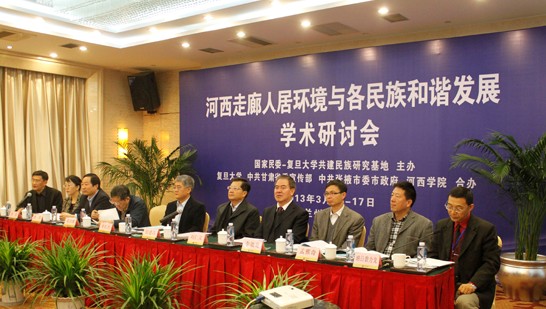Assessing environmental capacity is first step in developing Hexi, experts advise

The seminar "Harmonious development of the inhabited environment and all ethnic groups in the Hexi Corridor" was launched in Lanzhou.
On March 16th and 17th, an academic seminar on ecological restoration and stable social development in the Hexi Corridor took place in Lanzhou and Zhangye, in Gansu province. The seminar, entitled, “Harmonious development of the inhabited environment and all ethnic groups in the Hexi Corridor”, was jointly sponsored by the State Ethnic Affairs Commission and Fudan University’s Establishing Ethnicity Research Base and co-organized by Fudan University, the Gansu Provincial Party Committee Publicity Department, the Municipal Party Committee and Municipal Government of Zhangye, and Hexi University.
Experts and scholars carried on in-depth discussions in five different areas: theories and methods; countermeasures and applications; comprehensive comparison; history; and Yugur ethnicity and related studies. Li Hongjie, deputy director of the policy research office at State Ethnic Affairs Commission, Zhang Jianchang, administrative vice minister of Gansu Provincial Party Committee Publicity Department, and Liu Renyi, president of Hexi University were among the notable attendees at the seminar’s inauguration. Overall, more than 30 experts and scholars from as Fudan University, Minzu University, and other Chinese universities and research institutes were involved in the seminar.
Hexi Corridor is located in Northwestern Gansu Province. Since ancient times, it was a strategic location, serving as both a bottleneck for and gateway to the regions on the western periphery, and constituting a significant part of the Silk Road. As a key point on the latter, it was a center of cultural exchange. In terms of natural landscape, the Hexi Corridor’s ecosystem is complex but fragile, containing a string of oases surrounded by arid desert and mountain ranges.
Naran Bilik, a professor at Fudan University, claimed that studies on the inhabited environment should not be exclusively confined to the natural environment, but also focus on culture, arts, justice and ethics of the people inhabiting that environment. Scholars should emphasize the in-depth exploration of ancient wisdom and cultural in order to cultivate cross-linguistic, cross-cultural and interdisciplinary ecological philosophy, living wisdom and life philosophy. Naran Bilik added that scholars’ studies should be life-oriented and ecology-oriented, with the ultimate goal of constructing an ecologically accurate view.
In the view of some experts, ecological restoration in the Hexi corridor should be incorporated in the thought and discussion on nation building and national development—this is the key to resolving the area’s ecological restoration issues. In urbanization, industrial restructuring and transforming China’s development pattern, such an approach will benefit both the environment and the economy.
Participants expressed ideas on how to combine the conservation of Hexi Corridor with urbanization. Ge Jianxiong, a professor at Fudan University, elaborated that the environment is weak and water sources are scarce in the western regions of the corridor. The first step in the process of developing the region is to consider the environmental capacity, Ge explained. China should make comprehensive use of the corridor’s natural and human environment, adjusting production and lifestyles accordingly, and transferring extensive management to oversee the careful protection of environment. It is our obligation to be responsibility for history, and its descendents, he concluded.
Li Zhigang, a professor at Xi’an Jiaotong University, added that with the process of urbanization and accelerated social change, keeping technological development and capitalization in check should stem from natural and humanistic norms. This kind of ethos will avoid loss of or damage to the inhabited environment at the hands of capital-driven expansion and production. It will also help to avoid overly uniform patterns of development and exacerbated social alienation. Teng Wuxiao, another professor at Fudan University, cautioned that urbanization may increase regional ecological fragility. As such, he advised establishing a mechanism of risk assessment that would bring together the government, social organizations and local communities.
The Chinese version appeared in Chinese Social Sciences Today, No. 429, Mar.20, 2013
Translated by Zhang Mengying
